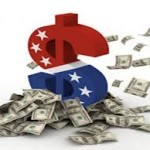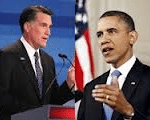![Predictions for the Next Four Years (Part 1 of 2)]()
by Steven Waechter | Nov 14, 2012
 Well, Barack Obama will be President for a second term. It is now time to take a look around, and prepare for what is likely to happen next. Based on my observations and what I’ve learned over the years, these are my predictions:
Well, Barack Obama will be President for a second term. It is now time to take a look around, and prepare for what is likely to happen next. Based on my observations and what I’ve learned over the years, these are my predictions:
No Housing Recovery
Commentators have been calling the bottom of the housing market – and screaming with increasing urgency that it was time to buy – since 2007. The Fed has cut interest rates to nearly zero, and through quantitative easing has flooded the financial system with new money. This will continue for the near future, especially since QE-infinity was announced earlier this year. There remains no recovery in the housing market, and there won’t be a recovery.
Bad monetary policy has left the productive bits of the economy in an absolute shambles, and now there simply aren’t enough jobs to allow a recovery in the housing market. This will get worse, not better.
Mass Layoffs
This one will happen sooner rather than later. In an economy that is as sedate as ours the likelihood of reduced unemployment is already pretty slim, and if you consider the looming Obamacare mandates, tax hikes on income, dividends, and capital gains, as well as another four years of an administration that has a penchant for change (breeding uncertainty), I predict that there will be large job losses coming in the very near future.
Growing Poverty
This one seems to fall into place as well, especially for those laid low by the layoffs which I think are coming. But, even those who keep their jobs will experience marked decreases in their standard of living. In an economy where consumption is king and production – or any sort of value-added economic activity – is outsourced, taxed, regulated, or outright banned, the remaining employment opportunities take on a sort of wistful irrelevance. Many will be nominally employed, but at the same time wholly unable to support themselves, let alone able to assemble savings.
Spike in Utility Rates
All forms of energy are likely to get more expensive over the next four years. Obama has explicitly stated that he intends to bankrupt the coal-generated electricity industry in favor of renewable energy kitsch which can only be financially feasible with massive increases in electricity prices. Expect some coal plants to be shut down in the next term, and expect to pay far more for electricity.
High Prices for Oil and Grain
In a past article, I pointed out that since 1990, the United States has run trade deficits in excess of $9 trillion. This despite the fact that in 1990 the supply of dollars (the M2 metric) was only $3 trillion. In an economy where we can buy foreign goods by printing money, there is no reason to manufacture much of anything. This dynamic will continue for the time-being, and we will import shiploads of consumer goods and pay for it with nothing but inflation. This will lead to even higher prices for oil and grain, which are inflation-sensitive commodities whose production cannot be outsourced.
Feeding grain to livestock is a value-added activity, however, and in an inflationary economy the price of grain will go up, and the ability of the public to buy meat will be reduced, so I am predicting a continued decrease in the number of farmers who bother to raise livestock, as well as a decline in the overall size of the livestock herds in the country.
College Tuition Spikes; Enrollment Begins to Fall
Obama’s attempts to reform the student loan industry had nothing to do with controlling the costs of college. The government runs most of the student loan industry, and interest rates have been kept very low for Federal loans. This is all designed to get more kids into college, regardless of what it costs, and with no real limit to the amount of credit available to the college-bound, there are no incentives for colleges to control costs.
The luster has begun to rub off of the whole college experience in my estimation. A college degree has become little more than a very expensive lottery ticket, and new college graduates will not see any discernable increase in their employment opportunities, incomes, or future prospects.
Even with the endless propaganda urging kids to attend college, the decision to attend college will not make financial sense for a large number of American kids, and we will begin to see a decline in enrollments, especially in full-time, traditional enrollments.
((To Continue Reading, Click Here To Go Straight To Part 2))
The post Predictions for the Next Four Years (Part 1 of 2) appeared first on The Conservative Reader.

by | Nov 6, 2012
 Final Thoughts
Final Thoughts
Setting The Senate Table– Here is the link to our Iowa Senate overview. Remember that as tonight starts Democrats already have 13 seats to the Republicans 11. Factoring in uncontested races and races heavily favored to one party or the other the tally is R’s-19 and D’s 18. Further adding in the 8 seats I see leaning one way or another leaves the count at R’s-24 and D’s21–with 5 seats as complete toss-ups.
A Blown Opportunity—The Republican Party of Iowa has done a great job this cycle by getting a candidate on the ballot in every Senate district statewide. That said, regardless of how things turn out tonight, if they fail to take the majority a big lost opportunity will be in Senate District 34. It is fair to note the Party really had nothing to do with this debacle and nobody could have predicted Randi Shannon’s melt down, which was the most embarassing episode in Iowa politcs in the last 10 years. However you feel about the Ron Paul movement afoot here in Iowa, the Liberty PAC endorsed and supported Shannon and must take a ton of blame here. This type of scenario playing out is absolutely unacceptable—if Republicans fall one seat short…this will prove haunting.
Differing Campaign Strategies—As we have discussed here before, one of the interesting things about the hotly contested Iowa Senate races is the opposite ways in which the two Parties have distributed money and resources.
While the Republican Party chose to spread their money around relatively evenly, the Democrats have staked out three races that they deem unacceptable to lose. In these three races, combining the October 19th and the just released November 2nd reports, the Democrats have spent $1.01 million dollars. The numbers are $381,000 in SD 26, $358,000 in SD 36, and $277,000 in SD 48.
If they don’t win these three seats, and lose a few other close ones they chose not to invest heavily in, this strategy will have been a disaster.
Time For RPI To Deliver—With the changing face of the RPI and the well documented upheavals along the way, perhaps no one has more on the line here in Iowa than the new leadership. Many of these new folks have heavy Ron Paul ties and have impressive political accomplishments in the past—these include Ron Paul finishing a very close 3rd in the Iowa Caucuses and winning numerous Straw Polls in several states. Winning elections is far different.
If Republican candidates do well this group can cement themselves, if they do not the battle to remove them will begin in earnest. I for one am pulling for them to succeed—a leadership that knows how to win elections is never a bad thing. If it turns out they can win elections, something tells me that compromising on both sides and co-existing is a real possibility.
What To Watch For
• If Ben Lange beats Bruce Braley or even runs within a few points of him, I believe there is over an 80% chance Republicans take the majority in the Iowa Senate.
• If Tom Latham is able to carry Polk County—and Romney is able to put up a good showing here—even if Romney loses Iowa I predict he will win the Presidency.
• If Tom Latham carries Polk County, 90% chance Dan Charleston is the new sheriff in town.
• Any of the following candidates winning will be the sign of a major Republican wave in Iowa—and likely nationally. The following are all great candidates and good people who are running in heavily Democratic districts: Dave Edwards (SD 16), Vicki Stogdill (SD 18), and Patti Branco (HD 34).
Predictions
President— Mitt Romney wins. Besides the enthusiam advantage, this prediction is based on the fact that no president in the history of our Country has been re-elected with economic numbers this bad and a set of “accomplishments” this unpopular. If he wins tonight then a shift has occured in America where results and actual achievements do not matter–I am cynical in general…but don’t believe we’ve reached this point yet.
Iowa Senate— Republicans win majority. Final count R’s-27 and D’s-23 (Note=this is counting Pat Ward’s Senate 22 seat as a Republican eventuality)
Iowa House— Republicans hold majority. R’s-57 and D’s-43
Iowa Congressional Delegation— Victors= King, Latham, Loebsack, and in an upset Lange just beats Braley in the state’s closest contest. Lange has a 25,000 voter registration deficit to make up here, but the district has seen him run both now and in 2010 and I think this history gets him over the hump this time. 25,000 is a big number to make up for sure, but keep in mind that he has a pool of 187,000 active Non-party voters to make it up in.
Thanks for following us in the lead-up to tonight, and be sure to check back in the following days for the breakdown of what happened here in Iowa and what it all means for the future of our great state!
![Predictions for the Next Four Years (Part 1 of 2)]()
by Steven Waechter | Oct 29, 2012
 I cast my ballot early. I didn’t vote third-party and therefore my vote isn’t being wasted. It also isn’t going to matter.
I cast my ballot early. I didn’t vote third-party and therefore my vote isn’t being wasted. It also isn’t going to matter.
Since 1990, the United States has run aggregate trade deficits above $8 trillion. This is funny, because in 1990 the M2 metric of currency supply was only $3 trillion. There should be nothing but dust coming out of the ATM machines. We have purchased entire merchant-fleets full of foreign goods, and paid for it by quite literally printing money.
Foreign countries, being more blatant about their currency devaluation policies, have been willing to go along with this arrangement. The result is this dynamic: The US prints dollars to buy goods from China, and the Chinese central bank prints yuan to buy the dollars. We get cheap Chinese stuff, the Chinese central bank gets huge dollar reserves, and the Chinese people get jobs and lots of inflation.
As the years went by, this dynamic absolutely shattered the productive impetus in the American economy. There is no reason to manufacture anything, or engage in productive activity in general. There is also no reason to hire people to help you be productive.
You can see this dynamic in your own communities, with factories that are closed, the kids that can’t find jobs, and farmers – busy producing inflation-sensitive commodities on land, which can’t be outsourced – buying new trucks with cash. The illness in our economy is bad monetary policy.
In a normal economy, if there is demand for consumer goods, entrepreneurs have to take land, labor, and capital and combine them in a way that produces goods efficiently, and at a price the general public can afford to pay. The American economy has another option – we can simply print money and spend it on imports, which is much simpler, requires no investment of capital or any hiring, and is much cheaper.
The result was the largest consumption binge in history, and an economy dependent on investment bubbles – tech stocks, housing, government bonds. The Federal Reserve poured new money into the financial system. You could get a home equity loan to cover your credit card debt, rung up at retail outlets selling almost exclusively imported goods.
Since manufacturing was on the way out, the service sector was the place to be, and the best service sector jobs require college degrees, so the answer is to go to college. Both parties agreed; the answer wasn’t to address the problems with our monetary system, but to attend college. Every young person was told that college is critical.
Now, we have more people in their 20’s living with their parents, more college graduates than ever are working part time, if they can find jobs at all, and the only policy solutions coming out of our elected officials is to double down on college, fund green energy schemes ( I‘m talking about you, Chuck Grassley) and economic development kitsch projects at all levels, building economic Potemkin Villages designed to try and keep the consumption binge going.
Close down Maytag? No problem! Build a race track! Remember when Nancy Pelosi said that unemployment checks would stimulate the economy? People need to spend, spend, spend, because there is no work, work, work.
Without the inflationary monetary policy coming out of the Federal Reserve, the government could not run the enormous deficits, the trade deficit couldn’t have gotten this large (currency would have become scarce, and productivity more valuable), and the government would have to be honest about the absurd arithmetic surrounding our entitlement programs.
Therefore, neither party will countenance a serious challenge to our current monetary system. Even Paul Ryan’s budget plan – so maligned by the left – doesn’t eliminate the deficit nor tackles entitlements. Sound money might even threaten the defense budget, and is therefore terrorism.
So, Barack Obama champions stimulus programs to re-inflate consumption and crows about tariffs on Chinese tires; Mitt Romney labels China a currency manipulator for being willing to bite the inflation bullet themselves and hold our currency as a reserve.
Work in a factory keeps their people busy and gives them the illusion of progress – a bit like how college keeps young people in America busy and gives their parents the illusion that their children will “amount to something.“ Concerns that college diplomas are worthless and that the wages of the Chinese factory worker are shredded by inflation are secondary.
Offshoring is not the machination of evil capitalists; it is a phenomenon of monetary policy, plain and simple. Other countries are willing to hold our currency as a reserve, so we can buy imports with inflation. According to the Examiner, Jeep is next on deck to offshore.
So, services and technological expertise is the key to success in America, as long as another large, developing economy doesn’t devalue their currency and start holding dollars as a reserve.
Especially not one with a large, English-speaking population, and definitely not one with a past influenced by British rule. Why, if that happened, we could just print money and buy our services from that country, and you would run the risk of not fully understanding the technician’s accent the next time you have to call tech support, which is simply unimaginable.
I cast my vote. I ended up voting for the one that I figure is less likely to throw me into a gulag. I suppose this makes my vote “idealistic.â€
Here we are. We have an economy that cannot produce wealth, based on consumption, with a government that we cannot finance and cannot change. We are consistently running trade deficits in excess of $40 billion per month but are told that we lack demand for stuff, almost 50 million people are dependent on food stamps, and an entire generation is shacked up at home, paying their student loans and otherwise too poor to participate in the consumption economy. Yet, there is no stomach for change.
When debating Walter Mondale in 1984, Ronald Reagan cited Cicero and remarked, “If not for the elders, correcting the mistakes of the young, there would be no State.â€
What are the young supposed to do when their elders who run the government have lost their minds?
The post Waechter’s Final Pre-Election Weigh In: No Matter How You Vote, the Economy Will Not Improve appeared first on The Conservative Reader.

![Predictions for the Next Four Years (Part 1 of 2)]()
by | Oct 25, 2012
 The Des Moines Register’s Editor, Rick Green, last night published some details around an interview that the Register’s editorial board held with President Obama Tuesday morning. An interview they could not, at first, talk about publicly. An off-the-record conversation that they say will contribute to their endorsement decision, and the conditions of which will not affect their decision.  Since Rick’s original online post, the White House has released their own transcript of the conversation.
The Des Moines Register’s Editor, Rick Green, last night published some details around an interview that the Register’s editorial board held with President Obama Tuesday morning. An interview they could not, at first, talk about publicly. An off-the-record conversation that they say will contribute to their endorsement decision, and the conditions of which will not affect their decision.  Since Rick’s original online post, the White House has released their own transcript of the conversation.
To his credit, Rick was clearly frustrated with the White House for putting such severe restrictions on the 30 minute telephone interview. He is convinced that Iowans need to hear what the President had to say, and that Iowans would be influenced positively by what Obama shared with the editorial board. The Register has been consistent in their effort to promote transparency in government, and should be applauded for their efforts.
Obviously, the President’s campaign (did we say “White House”?  Are the two the same?) was sensitive to the impact that even a handful of words can have in the world of instant communication. But this administration has been a paragon of secrecy since moving into 1600 Pennsylvania Avenue, and the 2008 campaign promise of transparency has proved not only to be a ruse, but largely ignored by both campaigns in 2012 and the mainstream media.
Rick’s comments attempt to provide an element of transparency at least to the Register’s process, but it’s unfortunate that he treats the President’s requirements for this interview as inevitable. Â Even though he challenged the decision, he said they “relented and took the call. Â How could we not?” Â I think the Des Moines Register’s influence is adequate enough that if they balked, it would have looked bad for the President and the White House eventually would relent because they would have to. Â How could the Register endorse the President without such a conversation?
But, given the idea that Obama is just so important and powerful a man that he should be listened to, the secondary piece of this was amazing to me. Â Rick stated later in his post that the “the White House’s decision won’t play a factor in our board’s final endorsement decision.” Â Perhaps that was a coded message to the Obama team that just the opposite was true. Â But it escapes credibility to believe that anyone in the Register’s position would not give serious consideration to this and other examples of the President’s opaqueness and attempts to control the messages going out so desperately. Â How the President of the United States tries to hide the most trivial information should have a substantial impact on the Editorial Board’s perception of this administration.
Looking back on this, before the White House released the transcripts, it is wildly crazy that there was any concern about the contents of the interview. Â The transcript was about as mundane as the first Presidential Debate. Â The sense is that the President has a cozy enough relationship with left-leaning media such as the Register that they can talk casually about how they will continue to change America in ways that the public doesn’t need to hear, but that the Register’s editors should hear in order to provide the “right” endorsement. Â Even though the Register apparently wants to avoid any such appearance, this sounds like a lot of back room dealing with members of “the team” to get the endorsement. Â Perhaps the White House figured out that the Register has more integrity than that. Â What concerns me is, what kind of off-the-record conversations are going on with other media organizations? Â We may never know.
By the way, the Register hasn’t actually stated that the transcript was accurate. Â I’m assuming they can tell us one way or the other, can’t they?
Image © Aaron Amat – Fotolia.com
The post Des Moines Register Challenge: Endorsement In Secret appeared first on The Conservative Reader.

![Predictions for the Next Four Years (Part 1 of 2)]()
by | Aug 23, 2012
 Lost in the sea of coverage following Mitt Romney’s selection of Paul Ryan as his running mate, was the news that the moderators for the three Presidential debates, and one VP debate, were also selected.
Lost in the sea of coverage following Mitt Romney’s selection of Paul Ryan as his running mate, was the news that the moderators for the three Presidential debates, and one VP debate, were also selected.
There is a certain kind of news one receives that falls into the category of “this may or may not be bad—but it can’t be goodâ€. For Republicans, learning of the moderators that will be at the helm for these four debates certainly earns this distinction.
In order of appearance they are- Jim Lehrer (PBS News Hour), Martha Raddatz (VP Debate-ABC News), Candy Crowley (CNN), and Bob Schieffer (CBS News).
Since the Romney campaign had to sign off on each moderator, it is hard to imagine that they could not have demanded better (even given that the Obama camp also had to sign off on each). By any measure, Jim Lehrer, Candy Crowley, and Bob Schieffer all lean to the left, and the networks that employ them all trail badly in the ratings to their direct competition.
Even if you were to say that these three were the fairest that both sides could agree to, giving a green light to Martha Raddatz for the VP debate was certainly inexplicable. The reason for this being, she is a “foreign affairs correspondent†which is not Ryan’s forte, and in fact he was brought into the race for his economic mastery. One has to wonder how much focus will be put on non-domestic topics just based on her area of expertise. On the surface this seems a major concession to the Obama campaign, and one that needed not be given.
The reason these moderators are so important is three-fold. First, with all the polls showing that the election has a likelihood of being razor-close, every small detail that goes into them has a chance to be huge. Second, like was the case with the Republican Primary debates, these four showdowns will smash records for viewership and the audience will include millions of Independents sizing up the candidates for the first time. Lastly, and most importantly, the questions asked of the candidates have the ability to dominate the crucial weeks of news cycles leading up to Election Day.
So What Should The Focus Be?
Poll after poll shows that for the American people ground zero in this election is the economy. A Pew Research Poll taken from June 7-17 asked voters to name the top issue that they will be considering in the voting booth in November. The top four answers were Jobs (35%), the Budget Deficit (23%), Health Care (19%), and Social Security (11%).
The danger in having biased moderators was on full display for the Republican Primary debate moderated by George Stephanopoulos, when, seemingly out of nowhere, he felt the need to drill down with Mitt Romney and Rick Santorum on the issue of female contraception. This gave birth (no pun intended) to the Sandra Fluke phase of the campaign and a multi-week sidetrack by the media away from the serious issues of the day. There is simply no doubt that, should they choose to, a moderator can actively push the focus to issues that are not widely being considered by voters—and into territory that favors one candidate or another.
As will be the case in October, it just so happens that the issues voters themselves say are paramount are the exact issues that President Obama is desperate to avoid talking about. In theory this would make the debates a huge opportunity for Romney and Ryan to drive home their message—something tells me it won’t quite go down that way.
Perhaps I will be proven wrong, but will these moderators have the gumption to ask President Obama why a myriad of the promises he made while running in 2008 have been unachieved or even un-attempted? Will they remind the American people that twice the President had budgets voted on by Congress, and he failed to receive one solitary vote for either of them? Will they ask why he promised to cut the deficit in half but instead oversaw three years of trillion dollar plus deficits? Or will they inquire why he has not laid a plan on the table for reforming entitlements, after saying himself this was crucial in 2008?
Republican Are Right to Be Nervously Skeptical
All things being equal, and according directly to the polls, the topics discussed during all four of the debates should almost exclusively be jobs, the deficit, the long term health of entitlement programs, and foreign policy. What I fear instead is painful subjection to multiple questions on gay marriage, abortion, contraception, and student loan debt— knowing all the while the fruit is rusting on the vine.
It is true that the level of professionalism that the four moderators will show is yet to be determined, and perhaps at least three of them will be fair (I hold no hope for Bob Schieffer). But given the track record of behavior the major media outlets have shown to Republicans in recent years, I’d say a mildly-crippling nervousness is more than justified.
After all, barring a phenomenal performance by both Republican candidates, one thing is certain—“it may or may not be bad…but it won’t be goodâ€.
The post The 2012 Presidential Debates: When Moderators Aren’t Moderate appeared first on The Conservative Reader.



 Well, Barack Obama will be President for a second term. It is now time to take a look around, and prepare for what is likely to happen next. Based on my observations and what I’ve learned over the years, these are my predictions:
Well, Barack Obama will be President for a second term. It is now time to take a look around, and prepare for what is likely to happen next. Based on my observations and what I’ve learned over the years, these are my predictions:



